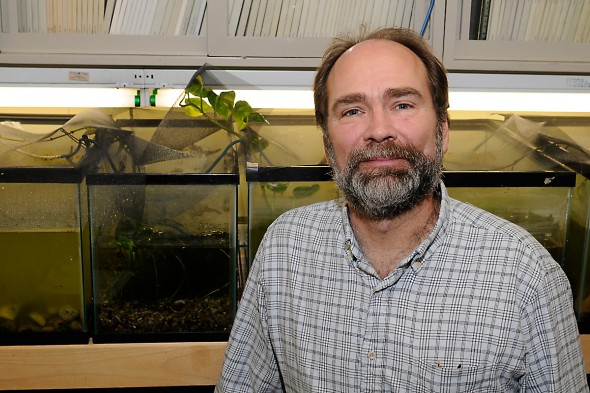Biologist ventures where the wild things are

“Evolution happens — it’s not just an academic hypothesis, it’s not a bizarre thought,” says Joel Brown, professor of biological sciences.
Joel Brown’s work has taken him all over the globe. But after coming to Chicago 26 years ago, he quickly took an interest in the city.
“In my time here in Chicago I’ve become deeply interested and deeply ingrained in issues of urban ecology, restoration, and management,” said Brown, professor of biological sciences. “For me it was that discovery that as much as I like game parks in Africa, we live in an urban game park.”
Brown was a keynote speaker at the fifth biennial Wild Things Conference Feb. 8 at Student Center East. Brown, widely known for his studies in evolutionary ecology, focused heavily on his evolutionary research during his address.
“Evolution happens — it’s not just an academic hypothesis, it’s not a bizarre thought,” said Brown, a 2009 UIC Researcher of the Year. “It’s happening whether we watch it or not, whether we want to believe it or not, or whether we want to study it or not.”
For Brown, the evolutionary dynamics of acclimation and adaptation are crucial to evolutionary biology.
However, the distinction between the two is often overlooked.
“Organisms first acclimate, then adapt to their circumstances,” he said. Acclimation includes behavioral adjustments that individuals make to their environment; adaptations are genetic changes that occur from generation to generation, he explained.
The jump from acclimation to evolution often happens quicker than one would expect. Brown’s beloved squirrels are a prime example of this drastic but alarmingly rapid change.
About 30 years ago, red squirrels moved from pine trees into the deciduous hardwoods around West Lafayette, Ind. Purdue University researchers found that red squirrels had changed their diet. Instead of foraging for soft pine nuts, they evolved to crack the much harder black walnut.
“In 20 years, these red squirrels evolved, not acclimated. They evolved more powerful jaws, a different muscle insertion in their jaw that made their jaw slower, but more powerful,” Brown said. “They became nut-crackers for hardwoods, instead of being soft pine nut foragers.”
Even the yellow jackets in Chicago have evolved to overcome the once reliable can of Raid. These insects have developed a resistance to pesticides that would normally wipeout an entire colony of bees in your backyard.
“You can just sit there and spray it on that yellow jacket until it is so wet with toxic goop that it can’t even fly,” Brown said.
“Then it will have the chutzpah to stand there in the sun, dry off and fly away. That’s the power of pesticide resistance.”
There is no doubting Brown’s passion for studying evolution. With evolution happening right under Chicago’s nose, it is difficult to deny biological evolution will continue whether we watch it or not. And with pesticide-resistant hornets flying around the city, it may be wise to pay attention to these changes.
“The wrong question to ask is: ‘Will evolution happen,’” Brown said. “The right question is: ‘How fast, and into what?’”
moconn31@uic.edu
